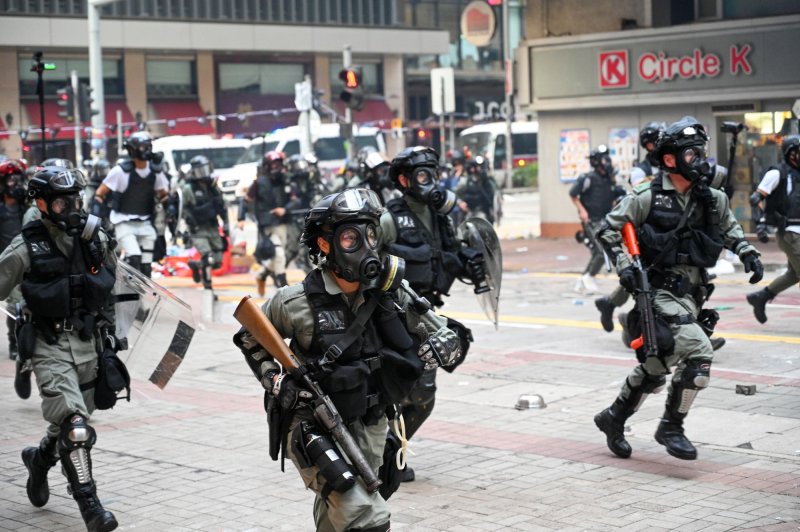
Taiwan vows 'necessary assistance' to Hong Kong residents
Protests reignited in Hong Kong over the weekend against Beijing's move to pass national security legislation, resulting in at least 180 arrests, police said.
by Darryl CooteMay 25 (UPI) -- Taiwan's President Tsai Ing-wen has promised "necessary assistance" to the people of Hong Kong after protests reignited in the semi-autonomous region over the weekend against Beijing's move to pass controversial national security legislation.
On her Facebook page late Sunday, Tsai said the people of Taiwan stand with those of Hong Kong in their struggle against China's introduction of a new security law.
"If the law is implemented, the core values of Hong Kong's democratic freedom and judicial independence will be severely eroded," she said, stating it "seriously threatens Hong Kong."
Late last week, China announced it was planning to pass legislation that would criminalize treason, secession, sedition and subversion against the central Beijing government and permit central government security forces to perform national security duties in the region.
The legislation's announcement followed months of often violent pro-democracy protests that rocked the semi-autonomous region starting last summer but have simmered for months amid the coronavirus pandemic.
Following the law's announcement, protesters returned to the streets over the weekend, resulting in police firing tear gas and water cannons at demonstrators.
Police said at least 180 people were arrested, mainly for participating in an unauthorized assembly, unlawful assembly and disorderly conduct. In a statement, police said "rioters" damaged stores and smashed windows, built barricades along roads and attacked officers and those they disagree with.
"Some injured victims have been hospitalized for treatment," police said in the statement.
The law has attracted international condemnation as it is widely viewed as in violation of the Sino-British Joint Declaration that returned Hong Kong from British to Chinese rule in 1997. The agreement states Hong Kong must exercise a "high degree of autonomy, rights and freedoms" for 50 years after returning to Beijing rule.
A Hong Kong government spokesman disregarded the criticism on Sunday as smacking of hypocrisy to suggest China "does not have the right to legislate to protect national security in the Hong Kong Special Administrative Region."
"The proposed law will only target acts of secession, subversion, terrorist activities as well as activities interfering with HKSAR's internal affairs by foreign or external forces," the spokesman said in a statement. "The vast majority of law-abiding Hong Kong residents, including overseas investors, have nothing to fear."
In her statement Sunday, Tsai said in the face of the protesters' demands for freedom, the answer is not bullets and repression by security forces but "the real implementation of freedom and democracy."
"This is the only way that Beijing and the Hong Kong government will regain trust and return Hong Kong society to freedom and calm," she wrote.
Foreign governments, she said, have extended "a helping hand" to the people of Hong Kong amid the protests and Taiwan will do the same.
Taiwan will "provide the necessary assistance to the people of Hong Kong," she said, without elaborating.
Tsai was inaugurated for her second term as Taiwan's president last week, stating in her inauguration speech that she rejects Beijing's demand for Taiwan to reunify with China.
Like Hong Kong, Taiwan is claimed by China but many on the island state, including Tsai, say it is an independent country.